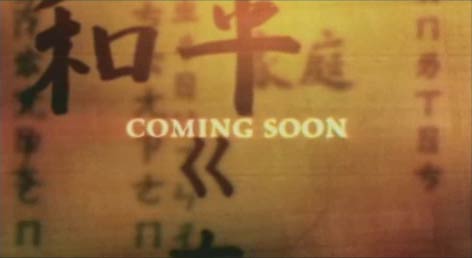Many Westerners are so attracted by Chinese characters, which tend to be absurdly exoticized as symbols [sic] or ideograms [sic] of deep meaning, that they place them here and there as if they were some sort of pixie dust that bestows coolness upon any object (or body). Often when they do so, they write these characters incorrectly or are mistaken about their meaning, as Tian of Hanzi Smatter continues to note. But you’d think that at least those who make trailers for Chinese movies would be a little better informed.
Fearless (Mandarin title: Huò Yuánji? / ???), which is billed as Jet Li’s final martial-arts movie, has been out in Asia since January but won’t reach the States until later this year. (I have no plans to see this movie, which appears from the trailer to be a string of the usual clichés. And, anyway, I have yet to forgive Jet Li for appearing in Hero, which is probably the biggest cinematic valentine to totalitarianism since Triumph of the Will.) One of the trailers for Fearless features a number of Chinese characters. They’re even written correctly. But, oddly enough, interspersed with the Chinese characters are zhuyin fuhao, also known as bopo mofo, a semi-syllabic script used in Taiwan mainly to help teach children to read. Odder still, the zhuyin make absolutely no sense.
Here’s how Taiwanonymous, on whose site I found this story, puts it:
Intercut with scenes from the movie was a burnt-yellow background, suggesting aged parchment, with Chinese characters flying past. Along with the Chinese characters were some Mandarin phonetic symbols (zhuyin fuhao ????). It’s bad enough that they included phonetic symbols (which are mainly used in Children’s books) in the flying sea of what wanted to be an ancient Chinese text, but the symbols flew past in strings of gibberish! Imagine the following text dramatically moving across the screen, “Integrity… Peace… Courage… Cabnap… Grunplitk… Uwsugls.” Gives you chills just thinking about it.
Here’s a screenshot from the trailer:

Just below COMING SOON is a giant ?. For something written in English this would be the equivalent of putting a large letter G on the screen.
Along the right side of the screen is the following, in zhuyin fuhao: ?????. This, in Hanyu Pinyin, would be “maixrici,” which is complete gibberish. The other vertical lines of text are also nonsense in zhuyin fuhao.
Again, there’s nothing wrong with how these are written. It’s just that they’re no more meaningful than a random string of letters.
Here’s one more shot:

The zhuyin fuhao on the left read, from top to bottom, ?????, which would be “chjktp” in Hanyu Pinyin. As I think should be obvious even to those who don’t know Mandarin or any other Sinitic language, this is simply nonsense.
sources:


